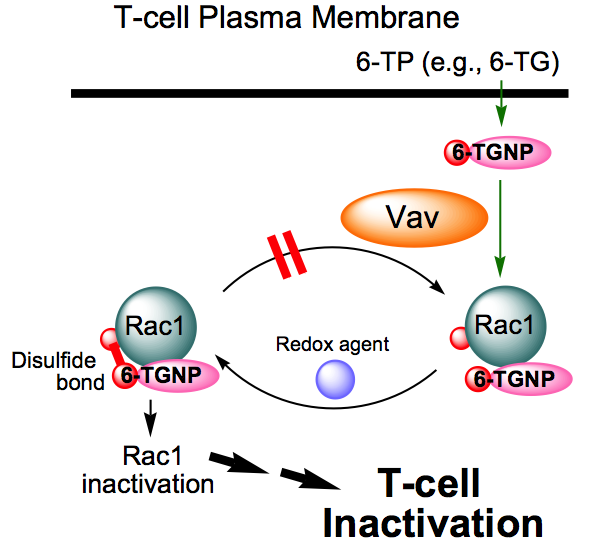Researchers discover mechanism behind immunosuppressive effects of drugs used to treat autoimmune disorders and cancers

Biochemists at The University of Texas at Arlington have demonstrated the mechanism behind how thiopurine drugs suppress immune response.
This knowledge could lead could lead to an improvement of those drugs, which are commonly used to treat autoimmune disorders and cancers, but are also associated with side effects like cardiovascular disease and hypertension.
"Up to now, no one has known exactly how the thiopurine immunosuppressive process works," said Jongyun Heo, associate professor of chemistry and leader of the study published in the Journal of Biological Chemistry. "We are hoping that this discovery also creates an opportunity to improve thiopurine drugs and to design new chemotherapeutic agents for autoimmune disorders."
The researchers showed that thiopurine drugs bond with Rac1 proteins within the immune system's T cells with a disulfide bond. This bond deactivates the protein and suppresses the cell's immune response.
This new study also demonstrated that thiopurine can also form bonds with other proteins in T cells like RhoA, which is involved in vascular functions, and Cdc42, whose aberrant activation can result in cancerous growths.
"It is now important to investigate whether thiopurine directly induces vascular or heart diseases through bonds with these other proteins, to alleviate potential cytotoxicities and side effects," Heo added. "There is also a potential opportunity to take advantage of this knowledge to develop new tools to fight cancer by stopping cancer metastasis by inactivating the proteins involved in cell proliferation."
Heo's co-author on the paper was Jin-Young Shin of the Biologics Research Division of the National Institute of Food and Drug Safety Division of South Korea. The work was supported through a National Institutes of Health grant.
The researchers used T cell-based oxidation reduction biochemistry approaches to examine the mechanistic features of thiopurine mediated Rac1 inactivation. These features, as explained in the diagram, detail a precise mechanism for this process.
Fred MacDonnell, UTA chair of chemistry and biochemistry, underlined the importance of this research in the context of UTA's increasing focus on health and the human condition within the Strategic Plan 2020: Bold Solutions|Global Impact.
"Large numbers of patients dependent on thiopurine drugs could potentially benefit from improvements in the drug or new drugs developed on the basis of this discovery," MacDonnell said. "Further research could also help improve our tools in the fight against cancer, which would be another important step forward."
More information: Jin-Young Shin et al. Thiopurine Prodrugs Mediate Immunosuppressive Effects by Interfering with Rac1 Protein Function, Journal of Biological Chemistry (2016). DOI: 10.1074/jbc.M115.694422
Journal information: Journal of Biological Chemistry
Provided by University of Texas at Arlington
















